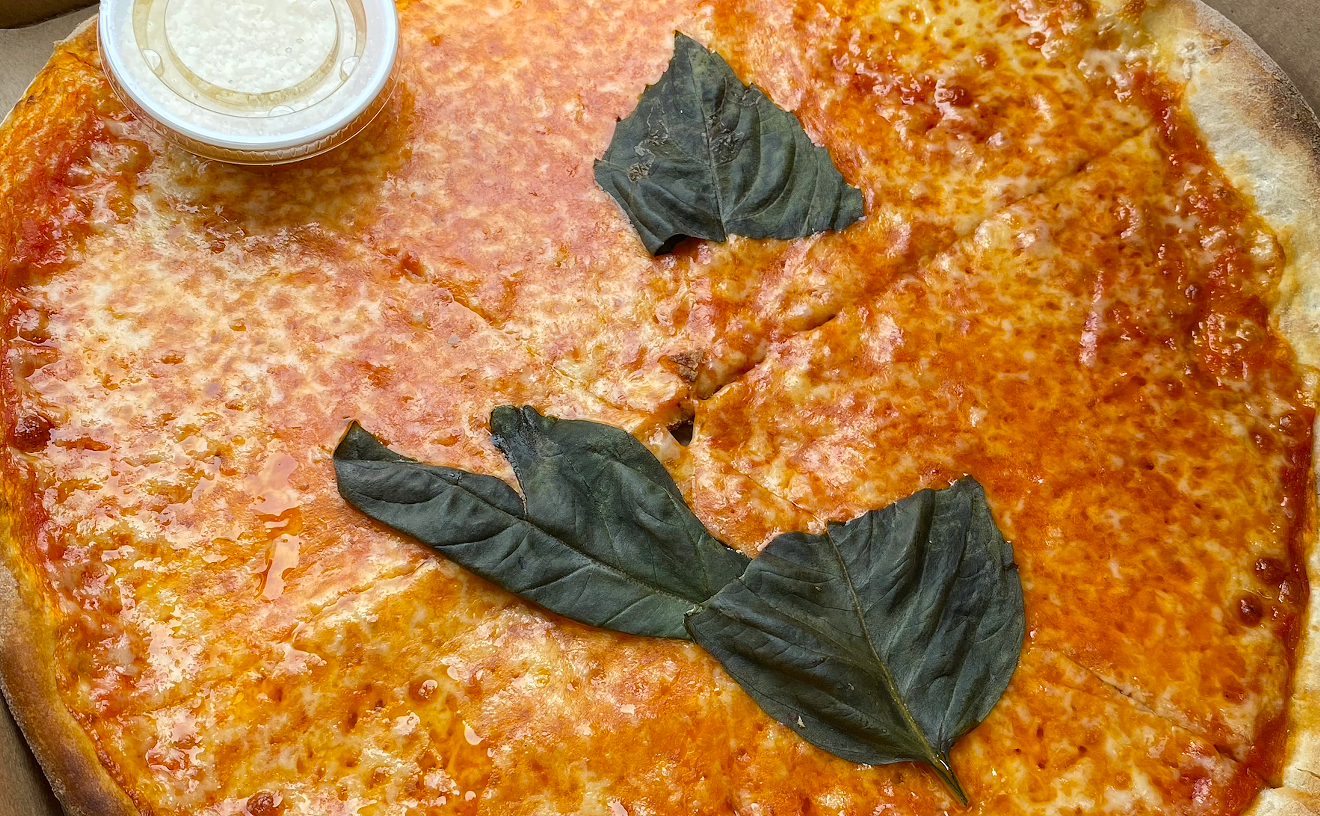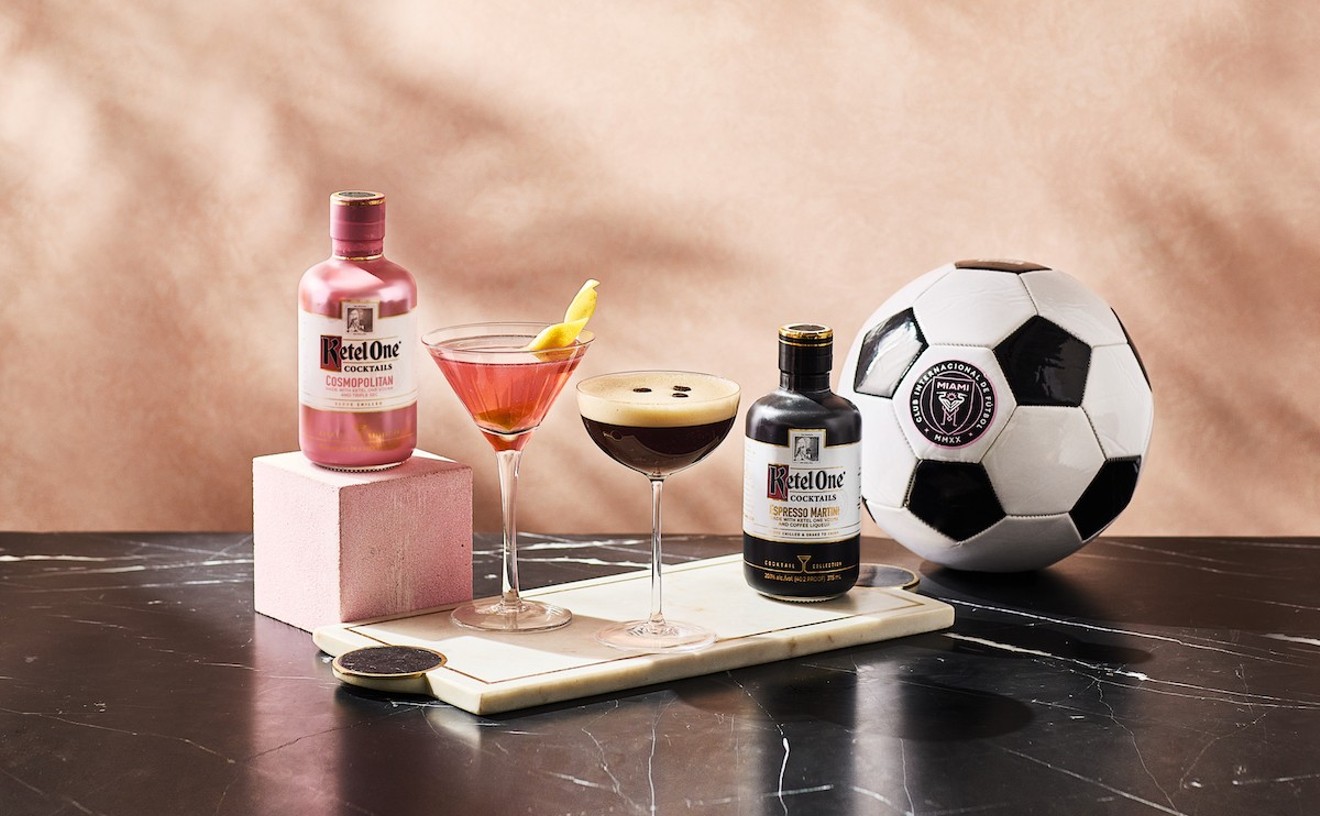My unspouse recalls that they never had a box of cereal or a bag of chips or a can of beans in the house that wasn't Pathmark brand. And her father, who still works as a government accountant, hasn't mellowed with age. While he was visiting, they managed to get into a heated argument at Publix over what brand of salad vinegar to buy. I'd sent them off on what was supposed to be a quick and painless errand. He was voting for the least expensive bottle — a five-gallon jug of distilled white laundry vinegar — calculated according to price per ounce. He could have saved us a cool 53 cents if she'd only listened to him.
She finally settled the matter, after 20 minutes of arguing, by citing my dubious reputation for persnickety exactitude. "Do you have any idea what it's like to live with somebody who can blind-taste eight kinds of balsamic and identify each one by vintage and province?"
Naturally, I wanted to take father-un-law to the priciest restaurant I could think of. As it happened, Buckhead Life Restaurant Group was just then making its first foray into the national market — they'd opened a Chops Lobster Bar in Boca Raton. That they'd chosen Boca over New York, Chicago, San Francisco, and Kansas City ought to clue you in about the kind of clientele they were cultivating. The Chops in Atlanta has long held a reputation as the kind of restaurant in which deals are sealed — partnerships forged, seductions furthered — by the kinds of people who like to think of themselves as very smooth indeed. As we waited in the lobby this breezy March night, I was passed by at least three ladies wearing mink jackets. Our table, which we had reserved for 8:45, wasn't ready. The manager, impeccably dressed in a $1,200 suit, was suitably apologetic.
But nothing in life is free, least of all for a gold digger. The Buckhead Life Group, which was founded by Pano Karatassos in 1979 and now runs ten restaurants more or less in the vicinity of Peachtree Road (Karatassos is the rough Atlanta equivalent of our own Burt Rapoport or Dennis Max), had honed the science of making money over the ensuing decades to a fine point. When you can reasonably expect your customers to pay $10 for a wedge of iceberg lettuce, you know your profitability index is pleasantly top-heavy. Here was a ratio of income to outgo that would gladden my father-un-law's heart (particularly since he was able to observe it at no financial burden to himself).
The Boca Chops is divided, like all of Caesar's Gaul, into three parts. There's a spiffy mirrored bar room with marble floors, curvy, cherry-red banquettes, and a piano player. The main dining room is a warren of glam-mahogany nooks and crannies lighted by art-deco sconces, brilliantly accommodating the needs of the mink-jacketed ladies to be seen, alongside their paramours' natural desire for privacy. And then there's the lobster bar, a sort of tongue-in-tail riff on Grand Central Station — all barrel-vaulted, herringbone-tiled ceilings and views of the open kitchen. Many a May-December romance was being conducted in the cuddly semi-circular booths the night we dined in this room, many an opening gambit played over tableside preparations of "classic steak tartare."
Nobody will ever accuse Chop's steak house and seafood menu of taking unnecessary culinary risks, but every bite of food we ate that night was certainly impeccable. There's a fine array of the kind of high-end, aphrodisiac shellfish likely to soften the hearts of 20-year-old maidens toward their distinguished suitors, food that is the gustatory equivalent of little pale-blue boxes holding diamond tennis bracelets. We live in a time where creatures once considered trash food by the upper classes, suitable only for savages who left oyster-shell middens the size of Egyptian pyramids, have become choice delicacies for today's captains of industry: iced cold water oysters — from the northwest coast or the east — cost $24 per dozen. You'd have to spend a minimum of $300 to ingest anything a 16th-century Native American might have considered more than a light, between-meal snack. Jumbo stone crab claws, five-pound Maine lobsters with or without crab stuffing, and whole Dover sole are all priced at Chops as the market will bear.
We whet our appetites with six blue-point oysters ($12), served with mignonette (a good red wine vinegar with chopped shallots) and a horseradish-y red cocktail sauce. They were stimulatingly icy and sweet, like a kiss on a winter day, and if they'd been plucked from a tributary of the Long Island Sound diverted down Plaza Real road, they couldn't have tasted fresher. A half Australian lobster tail ($24) had been flash-fried inside a weightless batter and served with creamy mustard sauce and clarified butter. I barely tasted the mustard sauce, because a chunk of this animal (which I hoped, as I chewed contentedly, had been murdered humanely and not dropped screaming and writhing into a vat of boiling oil) was best sampled dripping with melted butter, and I couldn't bring myself to share a bite of it. The meat was surpassingly tender cooked this way. My father-un-law polished off his $10 plate of lettuce, which had been convincingly disguised as a luxury item in blue-cheese dressing and diced, thick-cut bacon and tomato. There was some really delicious bread too: pumpernickel rolls stuffed with minced onion, sliced French bread, sweet raisin and nut loaf that fostered alpha brain waves when spread with soothing layers of softened butter.
I sipped my Gold Digger and listened to my unspouse name the many reasons she could become accustomed to eating lots of T-bone steaks and garlic-roasted Alaska king crabs at Chops. "Does this mean you're going to continue to claw your way up the soul-destroying corporate ladder at UniBank and forget about pursuing this silly three-year plan to go to law school?" I asked hopefully. "Because I don't think your pro-bono work for the transgendered semi-Olympic croquet team of Palm Beach County is going to pay for many porterhouse steaks with béarnaise sauce."
Somewhere along the line, my significant other has gotten the idea in her noggin that work is supposed to be satisfying and meaningful. "What meaning do you think I derive from eating fried calamari with lemon-caper aioli four nights a week?" I asked her. "Grow up. Life is just a lot of slogging through P.R. packets that read like the unabridged edition of War and Peace. "
She wasn't listening because she was oohing over what she pronounced "the most delicious fillet of sea bass [$34] I've ever had."
"That's Chilean," I said sourly. "I'd think a downwardly mobile do-gooder like you would recognize an endangered species when you saw one."
The sea bass was cooked "Hong Kong style," steamed in a delicate sesame-ginger soy broth in which bright-green spinach leaves had been barely wilted. There was a mound of florally scented sticky rice along with it. The fillet was buttery and unctuous, and a bite of it coated the mouth in waves of velvet.
I'd ordered a 22-ounce prime, bone-in, char-grilled rib eye ($39) — broiled, our waiter confided, at 1,200 degrees. How it is possible to expose a piece of flesh to this kind of heat and still have it come out cool and red in the center, as I like it, I can't say. It was nearly black on the outside, covered with a wonderful, fatty, crusty layer, and inside it was "to the tooth" as the Italians might say of their pasta — chewy in a good way and very rich in flavor, texture, and visuals. As I gnawed closer to the bone, it got better and better, because the bone juices, marrow, and fat had sort of caramelized.
Father-un-law expressed a lot of satisfaction with his planche-roasted king salmon ($27), a fish secure in the expression of its unalterable salmonness, the color of a Kodak sunset, and with a distinctly wild flavor. He liked that our waiter had asked him how he wanted it cooked ("they never ask me that at the diner"), and he ate steadily through the plate until he'd scooped up every morsel of buttery sauce, along with the good eight ounces of rib-eye I'd forked over for him and at least three quarters of the dish of Little Joe's spinach and mushrooms ($10, serving for three) and all of the rest of the bread. Then he allowed how he had saved room for an order of chocolate toffee cake ($10) and even a bite or two of my liqueur-infused banana cream pie ($10, as light as the toffee cake was heavy).
As you might imagine, the selection of wines, ports, Sauternes, cognacs, trendy vodkas, and rare malt whiskeys is expansive and eminently suited to a place that serves "Mishima Ranch 'Wagyu' kobe beef New York Strip" steaks.
We were so very, very happy, and we hadn't even been required to sleep with anybody to pay for this meal. We weren't worried about whether we'd get a promotion. We wouldn't have to marry any old people or even kiss any corporate ass. We sniffed the sirloin-scented air, and it smelled just like freedom.










